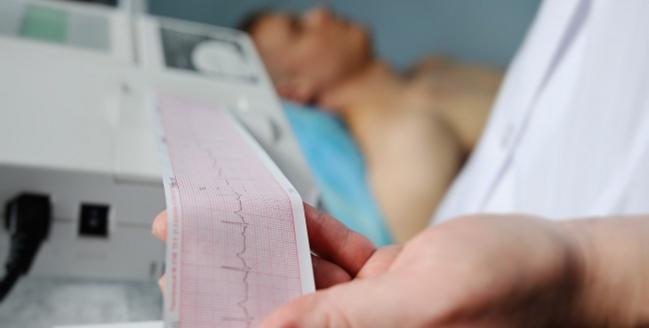Prostate Cancer Treatment Heightens Arrhythmia Risk
More serious ECG changes such as torsade de pointes and ventricular fibrillation are rare, but monitoring is advised.

Most men with prostate cancer who are treated with medical castration, also called androgen-deprivation therapy, will have an increase in QT interval, with torsade de pointes and ventricular fibrillation developing in rare cases, retrospective data affirm.
At a single Japanese center, QT interval corrected for heart rate (QTc) was prolonged in 79.9% of patients during therapy, according to researchers led by Kanae Hasegawa, MD, PhD (University of Fukui, Japan). The QT interval increased by an average of 12 ms, and the QTc by an average of 23 ms (P < 0.001 for both).
Two patients (1.3%), neither of whom had known CVD risks, developed torsade de pointes/ventricular fibrillation, the investigators report in a study recently published online in the Journal of the American Heart Association.
“Much attention should be paid to the corrected QT interval throughout all periods of medical castration to prevent torsade de pointes, ventricular fibrillation, and sudden death in patients with prostate cancer,” Hasegawa et al conclude.
Joe-Elie Salem, MD, PhD (Sorbonne Université, Paris, France), who was not involved in the study, agreed, pointing out that this study builds on others showing that androgen-deprivation therapy is associated with QT prolongation. But this is one of the few analyses, he added, that provides information on incidence.
Salem told TCTMD that this is a neglected issue of which most physicians who treat prostate cancer are not aware, as relevant research has only just emerged in the past 3 or 4 years. Despite the low rate of torsade de pointes/ventricular fibrillation, more attention needs to be paid to the potential for arrhythmic complications, he indicated: “When you consider the huge amount of patients with prostate cancer treated with androgen-deprivation therapy, I do think it’s a major concern.”
To put it in perspective, Salem mentioned the concerns raised about QT prolongation associated with hydroxychloroquine earlier in the COVID-19 pandemic, pointing out that the magnitude of the increases in QTc interval are much greater with androgen-deprivation therapy.
Malignant Arrhythmias Are Rare
Medical castration—achieved by suppressing testosterone with gonadotropin-releasing hormone analogues—is one of the main treatments for prostate cancer. Prior research has suggested that it prolongs QTc interval and may lead to the development of potentially life-threatening arrhythmias. But data are limited.
To further delve into this issue, Hasegawa et al examined data on 149 men (mean age 75) treated with medical castration using gonadotropin-releasing hormone agonists with or without antiandrogens at the University of Fukui Hospital between April 2006 and December 2017. Most patients (65%) received leuprolide, with 24% receiving goserelin and 11% degarelix. More than two-thirds (69%) also received antiandrogen drugs or androgen synthesis blockers.
Prior to initiating therapy, only 13% had a history of CVD—7% angina, 5% MI, and 1% spastic angina.
Compared with baseline, 12-lead ECGs recorded a median of 25 months after starting treatment showed average increases in both QT interval (394 to 406 ms) and QTc interval (416 to 439 ms). Slightly more than half of patients (53%) had an increase in QTc of more than 20 ms, and 12% had a rise exceeding 50 ms. QTc intervals of at least 500 ms were seen in 3%.
The two patients who developed torsade de pointes/ventricular fibrillation—at 6 months and 22 months after initiating treatment—did not have structural heart disease or family history of cardiac disease; angiography confirmed a lack of ischemic heart disease in both cases. The increase in QTc interval exceeded 80 ms in the men, who each had a starting value below 440 ms. Discontinuation of therapy improved QTc intervals for both patients, and neither died.
“When patients develop torsade de pointes/ventricular fibrillation during medical castration, a prompt cessation of the therapy and a correction of the electrolyte disorder, if it exists, are indispensable to avoid recurrences . . . and sudden death,” the investigators say. They additionally recommend that a rise in QTc of greater than 50 ms should prompt consideration of stopping therapy.
ECG Monitoring Essential
Salem said patients undergoing medical castration for prostate cancer should be evaluated with ECG, which is inexpensive and might help stave off the development of torsade de pointes/ventricular fibrillation and, potentially, sudden death.
The potential complication is particularly important among men with prostate cancer, who often are older, have other preexisting risk factors that increase the likelihood of QT prolongation, or are taking medications that might increase QTc intervals, Salem said. “All these drugs put together in this fragile population can be a bad cocktail.”
Moreover, androgen-deprivation therapy has been shown to increase lipids, glucose, and fat mass, underscoring the need for a cardiology assessment in patients treated for prostate cancer. “Doing a baseline EKG and assessing all the cardiovascular risk factors for these patients is something that needs to be done,” Salem said, suggesting a follow-up test 1 to 3 months after starting treatment.
When you consider the huge amount of patients with prostate cancer treated with androgen-deprivation therapy, I do think it’s a major concern. Joe-Elie Salem
Arja Vink, MD, and Pieter Postema, MD, PhD (Amsterdam University Medical Centers, the Netherlands), also make the case for mandatory ECG monitoring in this patient subset.
“The extent of QTc prolongation following medical castration may be small and not clinically relevant in most patients; it may, however, lead to dangerous QT prolongation in individuals who have a reduced repolarization reserve, either genetically or secondary to the use of QT-prolonging drugs,” they write.
“In the absence of specific measures for different patient categories,” Vink and Postema advise, “general precautions would apply to this finding: when the QTc is > 500 ms or if there has been an increase of at least 60 ms compared with baseline values, additional awareness should emerge. This involves evaluations on other QT-prolonging drugs (considering the possibilities to limit drug exposure), potassium plasma levels (considering the possibilities to increase plasma levels and thereby reduce the QT interval), and continuation of the testosterone suppression (discontinuing or lowering of the therapy should be considered).”
They acknowledge that “the latter is also not a simple task as a certain chance of malignant arrhythmias versus incomplete suppression of prostate cancer needs delicate balancing, preferably together with the patient.”
Todd Neale is the Associate News Editor for TCTMD and a Senior Medical Journalist. He got his start in journalism at …
Read Full BioSources
Hasegawa K, Ito H, Kaseno K, et al. Impact of medical castration on malignant arrhythmias in patients with prostate cancer. J Am Heart Assoc. 2021;10:e017267.
Vink AS, Postema PG. The role of testosterone and gonadotropins in arrhythmogenesis. J Am Heart Assoc. 2021;10:e020300.
Disclosures
- The study was supported in part by the Akaeda Medical Research Foundation research grant and Grant-in-Aid for Young Scientists (Japan Society for the Promotion of Science).
- Hasegawa, Salem, Vink, and Postema report no relevant conflicts of interest.




Comments